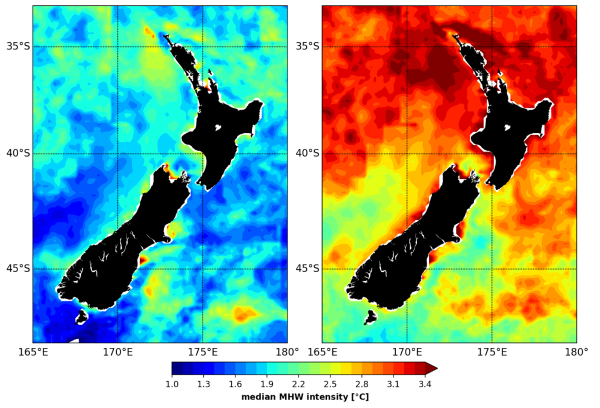A marine heatwave is a period of prolonged warming of the sea surface temperatures that can extend thousands of kilometres. For example, some heatwaves in New Zealand have spread across most of the Tasman Sea.
What effect do they have? Marine heatwaves exacerbate multiple coastal stressors already under pressure from a warming climate, including: lowering oxygen levels, making water more acidification and lowering water quality. They can cause mass-mortality in marine life, disturb ecosystems, and pose serious problems for fishing and aquaculture, as well as contributing to land heatwaves and climate extremes across the country. How are NIWA exploring marine heatwaves? NIWA interest in marine heatwaves is focused on enabling Aotearoa to understand, anticipate and manage the impacts of MHWs on coastal ecosystems. NIWA experts have exceptional track-records of research across the critical spectrum of domains related to MHWs in Aotearoa-NZ’s coastal waters. This includes modellers, physical oceanographers, ecologists, biogeochemists, social and adaptation scientists. Why study this area? Biodiversity, ecology and food webs are already being altered by MHWs and will affect our unique, productive and biodiverse ecosystems and their services, particularly in shallow coastal regions. Research in this area aims to provide the science that can guide sustainable management of Aotearoa-NZ’s marine biodiversity and ecosystems, with clearly identified adaptation pathways for ecosystem resilience and protection, whilst also enabling cultural values, community resilience and the marine economy to thrive.

Marine heatwave conditions: left – today, right – 2100 (NIWA, Deep South Challenge)
Updates Sea Surface Temprature update


